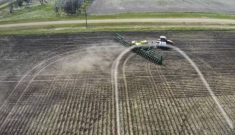At first, he doesn t seem like the kind of person you owe $17 billion to. Sure, Farm Credit Canada s national headquarters in Regina is a stunning, shimmering monument. And yes, Greg Stewart s office here is pristine and elegant in a way you see only in the offices of top echelon executives.
Stewart is also obviously at home here. He manoeuvres in his office with the ease of any farmer in a tractor cab.
And don t mistake, there is no shortage of ambition in the air. Stewart takes his role seriously. He sees his job as fostering the growth of Canadian agriculture one of the hottest agricultural industries on the globe.
Read Also

How scientists are using DNA and climate data to breed crops of the future
A method for forecasting how crops will perform in different environments so that plant breeders can quickly select the best parents for new, climate-resilient varieties.
It s a job he likes to do well. Indeed, under his stewardship, FCC has scored year after year of double-digit growth in its loan portfolio.
Yet Stewart also knows that this is a corporation with farm clients who are on a first name basis with the reps working out of FCC s 100 regional offices, but who couldn t pick him out of a lineup of bankers if their mortgages depended on it.
But, Stewart is the one who knows where FCC is going, and he s the one who knows the obstacles that must be overcome in order to get there.
Building a career
Stewart never felt destined to work in finance, much less be the top dog in ag lending in Canada. He originally wanted to be a farmer.
He grew up throughout Western Canada, moving several times with his family during his younger years, but he always considered home to be a farm that a cousin now owns and operates near Benito, Man.
I spent every summer I could arrange out there when I was a kid, Stewart reminisces. I loved it.
In fact, he loved it so much that in 1979 he was trying to see if there was any way he could become a farmer himself, until reality set in. Farmland and equipment prices had already spiked on the grain boom of the 1970s, pushing capital requirements up and up.
Getting going and finding that kind of money proved to be pretty-much impossible for anyone starting from scratch. He was disappointed at the time, but after watching the ensuing bust, you get the feeling he knows he dodged a bullet.
In retrospect, it was for the best, he says. It didn t matter how good you were, if you started in 1980, it was a rough ride.
The next stop was the construction industry in Edmonton, where he spent several years building houses and operating his own company. He enjoyed the work and met with some success, but later injured his back on the job site.
I was 24 years old, and they told me I could either have serious back surgery or go find another way to earn a living, Stewart explains. I opted to go back to school.
Back to school meant the University of Manitoba, where he earned an undergraduate degree in agricultural economics in 1987, joining FCC later that year in its Brandon, Man. regional office.
Times were tough and Stewart quickly became immersed in the seriously and frequently painful exercise of working off the hangover from the grain boom and bust all the while mindful that he was looking at what could have been his own fate had things worked out just a bit differently.
We were at times doing two Farm Debt Review Board hearings a day, and every one of them was very difficult for the people involved, Stewart says. So many














